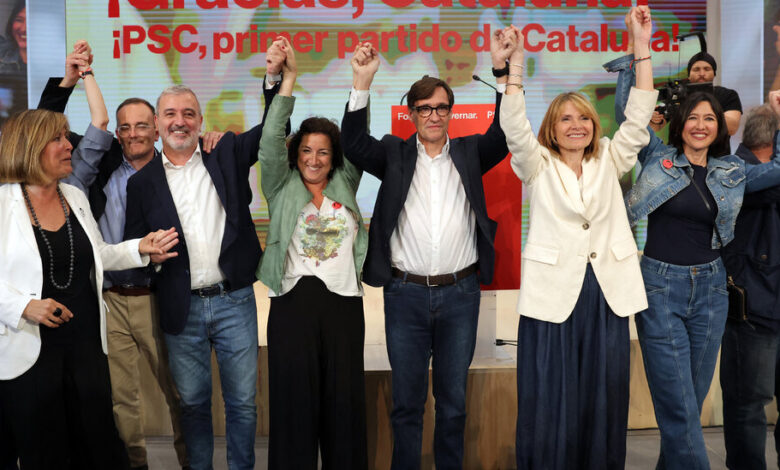Spain’s socialists win Catalan vote dominated by amnesty for separatists

Spain’s ruling Socialist Party emerged on Sunday as winner of regional elections in Catalonia, which many see as a test of the Prime Minister’s polarizing amnesty measure. General Pedro Sánchez towards the separatists.
The Socialists are celebrating what they say is an important victory, even though they did not win enough seats to govern on their own. They are likely to face weeks of negotiations and possible re-election if no deal is reached. But for the first time in more than a decade, they were able to form a regional government led by an anti-independence party.
Addressing supporters on Sunday evening at the Socialist Party headquarters in Barcelona, the party leader, Salvador Illa, declared: “For the first time in 45 years, we have won the election in Catalonia, both in terms of seats and votes. The Catalan people have decided to open a new era.”
However, Mr Illa, who has promised to improve social services, education and drought management, will need 68 of the Catalan Parliament’s 135 seats to form a government. On Sunday, his party won just 42 votes, meaning he will have to seek support from the pro-independence Esquerra Republica de Catalunya (Left-wing Catalan Republican Party) and the left-wing Communist Party.
“Winning does not mean governing,” Toni Rodon, a political science professor at Pompeu Fabra University in Barcelona, said before the results. While Esquerra supported Mr. Sánchez in the Spanish Parliament, he said, the negotiations in Catalonia did not. expected to be easy.
The Socialist Party’s main rival is the pro-independence Junts per Catalunya (Together for Catalonia), led by Carles Puigdemont, who campaigned from exile in France. Junts came second, but with 35 seats will not be able to form a government with other pro-independence parties, which have performed poorly.
Esquerra’s leader, Pere Aragonès, who is also the outgoing president of the Catalan government, called early elections after failing to muster enough support to pass a regional budget. After winning just 20 seats on Sunday, his party now faces a verdict.
On Sunday night, Mr. Aragonés attributed Esquerra’s poor results to the party’s policy of reaching agreements with the Socialist Party, which, he said, “are not taken seriously by the people.” From now on, he said, “Esquerra will be in the opposition.”
Professor Rodon said it was a clear sign that he was not willing to negotiate with Mr. Illa and that without Esquerra’s support, Catalonia could “consider a new election in October”.
According to Ignacio Lago, a political science professor at Pompeu Fabra University, even if no agreement is reached and elections need to be repeated, “for the first time in many years, pro-independence parties not a majority”.
The issue of amnesty for separatists has been divisive for years.
When Mr. Sánchez first came to power in 2019, he said he would not abandon pending legal action against Mr. Puigdemont or others accused of separatist activity.
But Mr. Sánchez reversed himself after Spain’s general election last July, when his only chance for a second term was subject to the demands of Mr. Puigdemont’s party, which became The king won seven seats in parliament overnight. Mr. Sánchez, who is known as a political survivor, brokered an amnesty deal with the Junts, calling it the best way for peaceful coexistence in Catalonia.
The amnesty proposal is extremely unpopular in Spain. Two rival parties organized one big demonstration protests against the deal last November in cities across the country, and other protests not officially supported by the parties broke out for several consecutive nights outside the Socialist Party headquarters in Madrid.
At one point, a larger-than-life dummy of Mr. Sánchez with a long Pinocchio-style nose was beaten to pieces by a mob.
The amnesty bill has stalled in the lower house of the Spanish Parliament after being passed by the Senate in March. Legal challenges could also still delay the measure.
Isabel Díaz Ayuso, head of Madrid’s regional government and a member of the center-right People’s Party, called the amnesty “the most corrupt law in our democracy.”
According to a report published by the Royal Elcano Institute, an international affairs research group based in Madrid, historically support for Catalan independence has been no greater than 20%. That changed in 2010, the report said, after the financial crisis in the euro zone and austerity policies imposed on Spain by the European Union encouraged “messages populist financial rebellion” in Catalonia. The British government’s decision in 2012 allowed it referendum on independence in Scotland supporting separatists in Spain.
Tensions in Catalonia peaked in 2017, when the separatist government led by Mr. Puigdemont ignored Spanish courts and conducted an illegal independence referendum. ONE Declaration of Independence followed by a crackdown on separatists by the Spanish government, fired the Catalan government and impose direct control. Nine political leaders was imprisoned for crimes including incitement to riot, while Mr. Puigdemont fled to France, nearly being arrested.
Successive Spanish leaders, including Mr. Sánchez during his first term, have tried unsuccessfully to extradite Mr. Puigdemont.
In 2021, Mr. Sánchez’s administration took a more conciliatory approach with Mr. Puigdemont’s allies still in Spain, pardoned nine people in prison.
The key question now, according to Cristina Monge, professor of political science and sociology at the University of Zaragoza, is whether the “spirit” of the Catalan independence movement still exists.
Positive election results for the Socialists in Catalonia on Sunday showed the prime minister’s high-risk gamble on amnesty paid off, easing separatist tensions in the region and helped normalize Spanish-Catalan relations.
Professor Lago said: “We have turned the page on the independence movement in 2017.
A study carried out by the regional government’s Opinion Research Center shows that a growing proportion of Catalans – 51.1% in February, compared to 44.1% in March 2019 – support Support to stay in Spain.
Independence is no longer “a top priority for many voters,” Professor Rodon said, adding that the change may reflect general dissatisfaction with pro-independence parties rather than Interest in separatism is waning.




